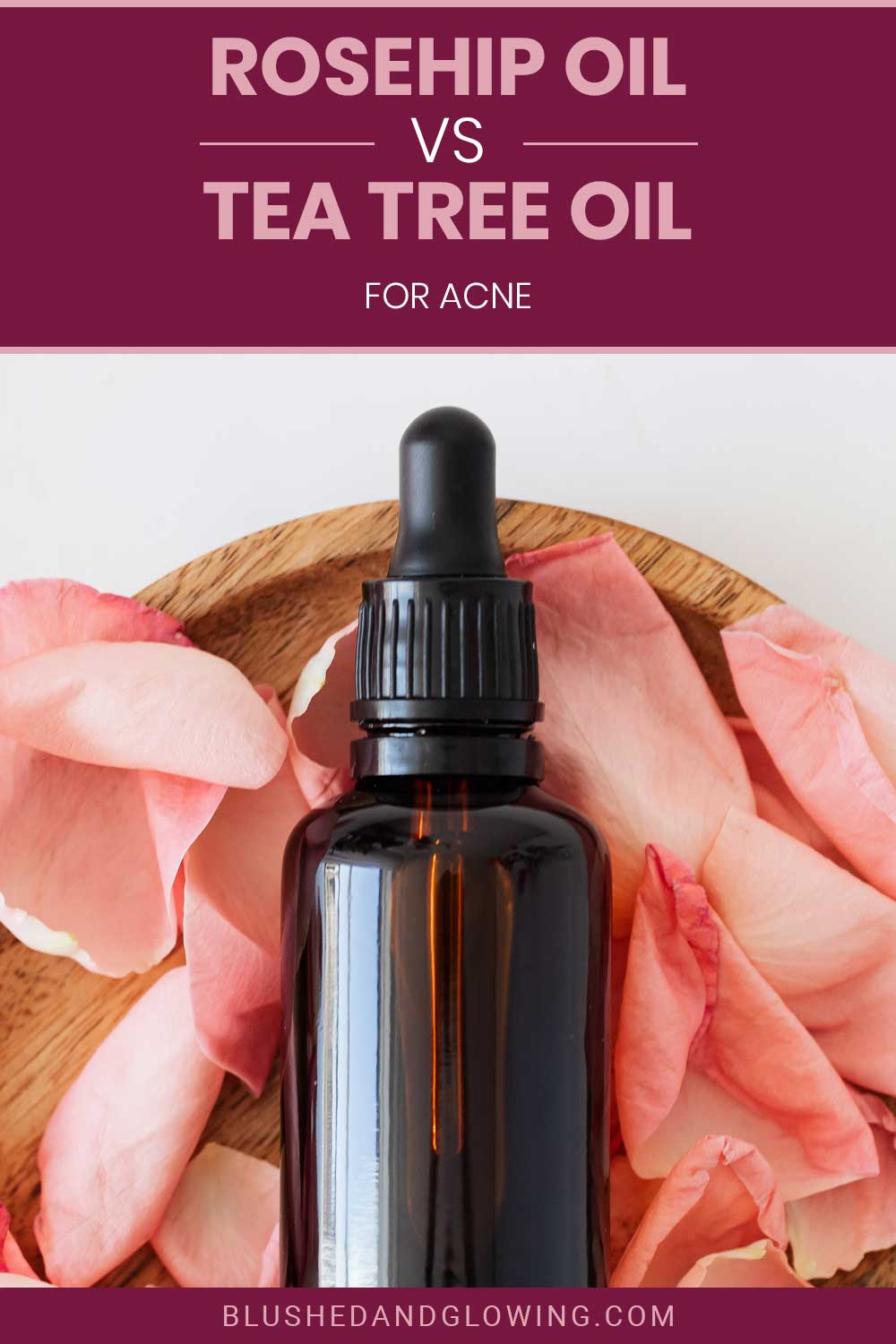Rosehip Oil Vs Tea Tree Oil for Acne
We may earn commissions for purchases made through links on our site. Learn more on our about us page.
With so many options out there for the treatment of acne, it can be quite frustrating to find the right skin care product that works for you and meets your needs. The overwhelming feeling of trying to figure out which ones to choose can almost put you in decision paralysis.
That’s why today we are going to look at two of the most popular: rosehip oil and tea tree oil. Both have passionate supporters when it comes to their effectiveness as solutions for cleaning up acne.
But which one works the best? Let’s take a closer look at the benefits and drawbacks of each and see which one comes out on top!

What are the Similarities?
When it comes to treating acne, both rosehip oil and tea tree oil have a lot in common. Both are natural products that arrive from plants.
That means they’re generally there to be safe for use on your skin, and they’re less likely to cause irritation or other negative side effects than some of the harsher, chemical acne treatments out there.
But that’s just one of the similarities. Other similarities include the following:
- Both can help reduce redness and swelling associated with acne.
- Rich in antioxidants to help protect your skin from damage
- Rosehip and tea tree oil are non-comedogenic
What are the Differences?
While rosehip oil and tea tree oil have some similarities in terms of treating acne, they also have some very big differences that may make one more effective for you than the other. These clear relationship differences include:
- Tea tree oil is known for its powerful antimagnetic properties.
- Tea tree oil is typically more lightweight and absorbs quickly in the skin, While rosehip oil is a bit heavier and can take longer to sink in.
- Tea tree oil can sometimes cause irritation or allergic reactions.
Pros & Cons: Rosehip Oil vs. Tea Tree Oil for Acne
When making a big decision regarding your skin health, understanding the pros and cons can help as well. So here is a list of the pros and cons of each of these oils concerning treating acne:
Rosehip Oil
Pros:
- Rich and essential fatty acids help promote healthy skin cell turnover.
- Non-comedogenic
- Gentle and suitable for most skin types
- Contains antioxidants to help protect skin from damage and promote a healthy complexion
Cons:
- It may not be as effective at killing the bacteria that cause acne the decision
- Heavy texture may not be suitable for oily or acne-prone skin
- Then take longer to absorb into the skin, leaving a greasy feeling
Tea Tree Oil
Pros:
- Strong antimicrobial acromial properties to help kill the bacteria that cause acne
- Its lightweight texture makes it suitable for those with oily acne prone skin
- Able to help reduce inflammation and redness associated with acne
- It can be used to treat other skin conditions like fungal infections and dandruff
Cons:
- Some individuals experience irritation and allergic reactions
- Needs to be diluted before use
- It may not be as effective at reducing the appearance of acne scars
- The strong smell might not be pleasant for everyone
Which One Has More Natural Ingredients?
Many look for natural ingredients to live more sustainably and eco-friendly lives. Both rosehip oil and teen acne if you’re focused on this. However, if you’re looking for an oil that contains more natural ingredients, rosehip oil may be the way to go.
Rosehip oil is extracted from the fruit of the rose plant, and it contains a variety of natural compounds that are great for the skin.
Tea tree oil is extracted from the leaves of the tea product, which typically requires a bit more processing or requirement to extract the oil from the leaves.
Additionally, many brands may add synthetic fragrances or other ingredients to their tea tree oil products, which can dilute the oil’s natural goodness.
Which One Is More Versatile?
While both rosehip oil and tea tree oil can be effective for treating acne, tea tree oil has a wider range of uses, and the oil is well known for its antimicrobial properties, which means it’s effective at killing the bacteria that cause acne.
But it also is great for treating a variety of other skin conditions, such as fungal infections, dandruff, and even insect bites. In addition to its medicinal properties, the tea tree is also commonly used in aromatherapy and as a natural cleaning product.
You can add a few drops of tea tree oil to your diffuser to help clear your sinuses and improve your mood, or mix it with water vinegar to create a natural all-purpose cleaner for your home. While Rosa Boyle is also versatile, it does not have as wide a field of use.
Final Thoughts on Rosehip Oil Vs. Tea Tree Oil for Acne
So which oil is better for treating acne? What would depend on your skin type and concerns? Ultimately, your best choice would depend on your specific needs and preferences.
Both oils are natural, safe, and effective, so don’t be afraid to try them out and see which one works best for you.



Leave a Reply